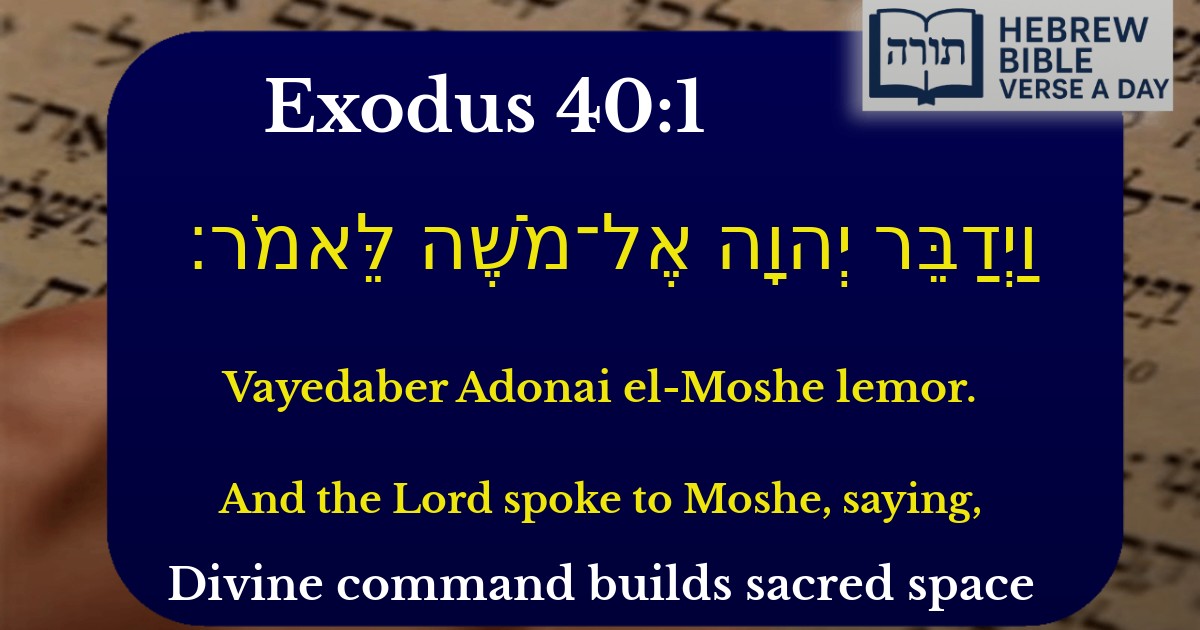Frequently Asked Questions
Q: What does 'And the Lord spoke to Moshe, saying' mean in Exodus 40:1?
A: This phrase introduces direct communication from Hashem to Moshe Rabbeinu (Moses our teacher). According to Rashi, this wording emphasizes that Moshe received precise instructions directly from G-d for building the Mishkan (Tabernacle), showing the importance of following divine commands exactly.
Q: Why does the Torah repeat 'saying' after 'spoke' in Exodus 40:1?
A: The double language of 'spoke... saying' teaches that Moshe was to repeat these instructions to the Jewish people (Rashi on Exodus 6:2). This follows a pattern throughout the Torah where Moshe transmits G-d's words faithfully to Israel.
Q: How many times does the Torah say 'G-d spoke to Moshe'?
A: The exact phrase 'And the Lord spoke to Moshe, saying' appears over 80 times in the Torah. The Rambam explains this repetition shows that every commandment came directly from G-d to Moshe, establishing the divine origin of Torah law.
Q: What was special about how G-d spoke to Moshe?
A: The Talmud (Yevamot 49b) teaches Moshe was unique among prophets - G-d spoke to him 'face to face' (Numbers 12:8) with perfect clarity. Unlike other prophets who received visions, Moshe heard G-d's words directly, as in Exodus 40:1.
Q: Why is Exodus 40:1 important for Judaism today?
A: This verse reminds us that our mitzvot originate from divine revelation. The Sforno explains that just as Moshe carefully transmitted G-d's words about the Mishkan, we must preserve Torah traditions exactly as received, maintaining the chain from Sinai to today.


The Divine Communication to Moshe
The verse "וַיְדַבֵּר יְהוָה אֶל־מֹשֶׁה לֵּאמֹר" ("And the Lord spoke to Moshe, saying") appears frequently in the Torah as an introduction to divine commandments. According to Rashi (Shemot 6:2), this phrasing emphasizes that Hashem's words were conveyed to Moshe with clarity and precision, ensuring accurate transmission to Bnei Yisrael. The term "לֵּאמֹר" ("saying") indicates that Moshe was to relay these words to the people.
The Significance of Direct Speech
The Rambam (Moreh Nevuchim 2:33) explains that when the Torah states "וַיְדַבֵּר יְהוָה," it reflects a unique level of prophecy granted to Moshe, distinguished by its immediacy and lack of intermediary visions or parables. Unlike other prophets who received messages through dreams or allegories, Moshe experienced direct communication ("פֶּה אֶל פֶּה", "mouth to mouth," Bamidbar 12:8).
Midrashic Insights
Halachic Implications
The Talmud (Sanhedrin 56a) derives from this phrasing that Moshe was commanded to teach not only the written Torah but also the oral traditions (Torah Sheba'al Peh). The repetition of "לֵּאמֹר" underscores the obligation to preserve and transmit both aspects of Torah law to future generations.